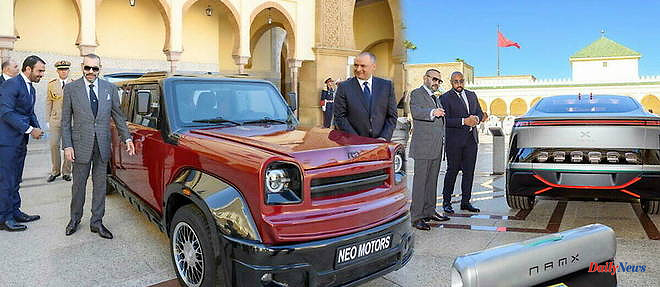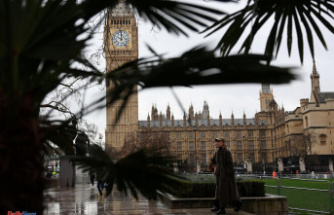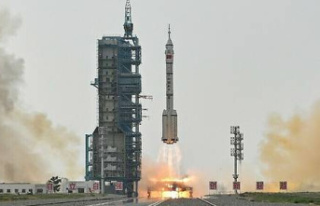Should we qualify the epic of the Atlas Lions at the Qatar World Cup as a simple major sporting moment for Morocco and for Africa or even more as a major historical turning point with high economic, social, or same policy? The question deserves to be asked as the approach to the challenges seems to have been nourished by a new state of mind among sportsmen and Moroccans on the street as well as among the authorities, starting with the most illustrious of them. : the king himself.
Credit where credit is due, let's start with football. Crowned with the prestige of being the first African and Arab country to reach the semi-final of the most popular sporting competition, the World Cup, Morocco offered itself the luxury of beating Brazil on March 25 in a friendly match. in Tangier. Final score: 2 goals to 1. "I'm in a dream, Brazil is the first team in the Fifa ranking, the country of football, and in the middle of Ramadan! exclaimed Moroccan coach Walid Regragui at the post-match press conference. And to add: "But the road is long, it is not necessary to ignite to reach new heights. »
Two months later, it was the turn of the Moroccan national under-17 (U17) team to reach the final of the African Cup of Nations (CAN) against Senegal. The illustration that the inspiration given by the Atlas Lions not only spreads but takes root is Morocco's new bid to host the 2030 World Cup alongside Spain and Morocco. Portugal. A way to perpetuate the unprecedented epic of Moroccan football in Qatar but also to superimpose its Mediterranean nature on its African dimension.
What is interesting in this orbit is that the Cherifian kingdom now dares to confront challenges without limiting itself. The victories enthuse, the defeats are managed but do not inhibit. It must be said that from Dakar to Dubai via many cities and countries, these moments of grace have been scrutinized with the greatest attention.
"The impossible is not Moroccan", wrote on Twitter the vice-president of the Emirates and governor of Dubai, Sheikh Mohammad ben Rachid, in reaction to the qualification of the Atlas Lions.
From what can one make such an assertion?
If the sporting talent is undeniable and explains it, it is also necessary to look further into cultural elements which could be the cause. An important notion for the Moroccan population comes to mind: that of "niya" which gives the "good intention" that accompanies the action a primordial importance as recalled by the book Qatar 2022, the Moroccan moment which retraced in detail the epic of the national selection and its components. "By making us dream and by giving a whole people joy, pride and a taste for a job well done, Lions have, to use common language, "done their part of the job", reads the preface to the book written by Driss El Yazami. Adding: "Other Moroccan leaders and officials in all fields and ordinary citizens to do their part", the President of the Council of the Moroccan Community Abroad (CCME) challenges all components of society.
For Mariam, a 30-year-old Moroccan, "such a victory "cannot be the result of chance". And to recall that "Morocco has not skimped on the means during the last ten years to get out of the crisis in which Moroccan football had plunged" in reference to the work carried out since 2010 by the Mohammed VI football academy. Anas, a 35-year-old Casablancan, sees it as "a gateway to triggering a new socio-economic dynamic" at a time when it is more than necessary in view of the information mentioned in a note from the High -Commissariat au plan Marocain (HCP) published last October and according to which 3.2 million Moroccans fell into poverty between 2014 and 2022.
The present is indeed somewhat gloomy due to inflation which continues to gallop with the rise in food prices under the influence of the deterioration of climatic conditions and the global economic slowdown. Growth, under the combined effect of drought and imported inflation, slowed to 1.3% in 2022 after the 7.9% rebound recorded in 2021. As a direct consequence of climate change, the year 2022 will have been the hottest year Morocco has seen in 40 years with the worst drought the country has experienced in several decades, causing a serious spike in food prices and a 2% drop in 2022 in power. household purchasing, according to the High Commission for Planning (HCP). Despite a significant and rapid tightening of monetary policy, inflation measured by the evolution of the consumer price index would have known, according to this Moroccan institution, an increase of 6.7% in 2022 instead of 1.6% on average during the period 2015-2020. "Vegetables, fruits, meat... everything is expensive, you have to do your accounts before going to the supermarkets," says Lamia, a young mother from Casablanca, whose consumption pattern has changed a lot in recent months.
A situation that worries some central trade unions, including the Democratic Confederation of Labor (CDT), which plans to organize a national protest march on Sunday June 4 in Casablanca. The reason given: "Political, economic and social choices of the government" and its "inability to activate the general increase in wages", in relation to the Social Charter and the content of the agreement of April 30, 2022 resulting from the social dialogue between unions, government and employers.
Yet, according to a recent report from PricewaterhouseCoopers, some sectors were able to do well in 2022. 150% for the first ten months of the year. We also observe a sustained pursuit of the automotive sector after its take-off initiated in 2014", can we read in this document entitled "The Moroccan economy between challenges and opportunities". And to add: "But it is the sales of phosphates and fertilizers that have recorded the strongest increases, with a notable rebound of 111% in 2022, thus surfing on the surge in world prices. These sales accounted for 23% of Moroccan exports. What to understand the industrial revolution led by OCP aimed at consolidating the group's global position in the fertilizer market.
So what should we expect from the Moroccan economy in 2023? "An improvement in its performance", according to the director of the Middle East and Central Asia department of the International Monetary Fund (IMF), Jihad Azour, in an interview with the Moroccan daily L'Économiste. "Morocco's qualification for the Flexible Line of Credit (LCM) in the amount of approximately $5 billion thus appears to be a notable achievement that reflects the solidity of the institutional framework and the economic fundamentals of the kingdom", underlines the head of the IMF, on the sidelines of the visit to Morocco on April 28 and 29.
According to IMF projections, the Moroccan economy should record a growth rate of 3% in 2023 and 3.1% in 2024. The same goes for the African Development Bank (ADB), which itself expects Moroccan growth of 3.3% in 2023-2024. Forecasts that push 73% of Moroccan leaders to remain "confident in the ability of their company to cope with the slowdown in the global and national economy", indicates the CEO Survey PwC Morocco. Thus, "investments should continue in the upskilling of talent but also in greater automation of processes and the deployment of digital", underlines the PwC report.
On the side of the General Confederation of Moroccan Enterprises (CGEM), the duo, recently re-elected at the helm of Moroccan employers, has made the promotion of investment one of the main axes of his second term. At the heart of the priorities of Chakib Alj, its president, and Mehdi Tazi, its general vice-president, "there is the implementation of the Investment Charter, the promotion of small and medium-sized enterprises (TPME) and above all the establishment of a new national industrial strategy focusing on industrial sovereignty in various sectors”.
In such a context, as if to set the tone and continue the momentum of the structuring initiatives that he has put into orbit since his accession to the Alaouite throne in July 1999, King Mohammed VI in person chaired in Rabat the presentation of two brands Moroccan hydrogen car companies, Neo Motors and NamX, the first founded by Nassim Belkhayat, the second by Faouzi Annajah and Thomas de Lussac.
This is an illustration of the desire to boost the momentum of one of the strongest manufacturing economies on the continent, as confirmed by the index of industrialization in Africa. Morocco is in second position there for the year 2022. Suffice to say that with these two automotive brands driven by local skills, Morocco has reached an important milestone.
"These two innovative projects will strengthen the promotion of the Made in Morocco label and will consolidate the kingdom's place as a competitive platform for automobile production", indicates MAP, the Moroccan press agency. One more brick, one could say, in the deployment of the new development model (NMD) which should make it possible to accelerate the integration of the kingdom into regional and global value chains in order to give it a place of choice in the world. horizon 2035.
With the launch of two 100% Moroccan cars, the challenge now is to further position these Made in Morocco products internationally thanks to a forecast annual capacity of 27,000 units and a local integration rate of 65%. In addition to the economic dimension, the production of the Hydrogen Utility Vehicle, whose industrial launch is scheduled for 2027, constitutes a major opportunity for the kingdom which is organizing itself to play a leading role in the world's energy supply. green via hydrogen.
A perspective completely in line with the kingdom's desire to structure the "Morocco supply" of the green hydrogen sector in the wake of the commitments made in terms of energy and ecological transition aimed at achieving a production rate of 52% of energy by 2030 as well as carbon neutrality by 2050. Rabat wishes, in fact, to increase fertilizer production capacities while committing to achieve carbon neutrality before 2040. Thus, the OCP, the global phosphate giant, plans to supply all of its industrial facilities with green energy by 2027. Enough to make Morocco one of the greenest countries in the world and, alongside economic resilience, to continue its health resilience.
During this month of May, a new university hospital center was inaugurated by Mohamed VI in Tangier. Built on 23 hectares of land, this university hospital, with a capacity of 797 beds, reinforces the healthcare offer in the northern region of the kingdom at a time when the country is working hard to reform its health system and put in place social protection for the benefit of all Moroccans by 2025. Highly anticipated, particularly by the inhabitants of the Tangier region, this hospital comes at a time when several Moroccan authorities are calling for improve the supply of medical care at national level, in particular the Competition Council. "The consolidation of the referential dimension of the public hospital, with substantive actions in favor of an upgrade and densification of the network of quality public hospitals, is imperative in the case of our country", says Ahmed Rahhou, President of the Competition Council, in his opinion published in December 2022 and relating to the functioning of the market for medical care provided across the country.
Football, economic environment, industry: faced with the immensity of the challenges to be met, Morocco has been able to cope thanks to the quality and self-sacrifice of local skills. This did not escape the King who has just made new appointments following the Council of Ministers on May 19. Objective: to inject new blood into large agencies and public administrations deemed strategic, in order to promote Moroccan resilience. Thus those in charge of Energy Efficiency, Nuclear and Radiological Safety and Security, Development of Logistics, Information (MAP agency), Planning (Al Omrane) and Credit agricultural. A way of better adapting to the changing situation locally and internationally and also of putting oneself in a position to be able to follow the trajectory of the recommendations of the new development model.












